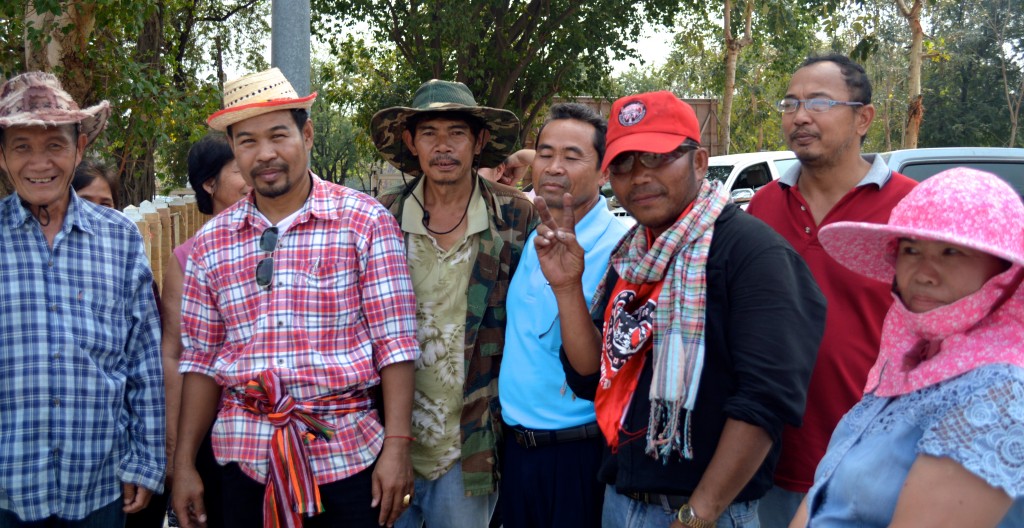KHON KAEN— Rice farmers are taking center stage in the political battle wreaking havoc in Thailand, as the debate shifts to the government’s controversial rice-pledging policy. In Bangkok, hundreds of farmers on Monday besieged Prime Minister Yingluck Shinawatra’s temporary headquarters, demanding their long overdue payments for last year’s rice crops. Meanwhile, in the Northeast, rice farmers gathered in the city of Khon Kaen to stage a counter-demonstration in support of the caretaker government and its rice subsidy program.

Rice farmers at Khon Kaen’s pro-government rally on Monday.
“We are not protesting about not getting money,” said Charoensab Jampathong, a 65-year-old farmer from Ban Phai district who participated in Monday’s pro-government demonstration. “We came here to support all the government officials who are working really hard to get money for us.”
An estimated 400 farmers gathered in front of Khon Kaen’s provincial hall on Monday morning and marched to nearby branches of the Bank for Agriculture and Agricultural Cooperatives (BAAC), Krungthai Bank, and the Government Savings Bank (GSB) to voice their support for the government and its rice-pledging scheme over loud speakers.
“They came here to say thank you to us,” the Director of BAAC’s Khon Kaen province branch, Thanoo Tosajja, said. “This is the first time that has happened.”
Leaders of the pro-government demonstration also met with the provincial governor in Khon Kaen on Monday.
“We told the governor that we support him as a government official, and would like him to communicate to the government that we like the rice-pledging program,” said Bhutdhipong Khanhaengpon, a radio DJ in Khon Kaen who participated in Monday’s rally.
The demonstration of support from farmers in Khon Kaen stands in stark contrast to the activity of farmers in Bangkok, who over the past month have blockaded major highways in several parts of the country, filed a court complaint to claim compensation from the government for delayed rice payments, and on Monday, breached barricades to Prime Minister Yingluck’s temporary headquarters.
The divergent reaction of the Central Thai farmers protesting in Bangkok and their upcountry counterparts is symbolic of larger political rifts dividing the country. Whereas Bangkokians have taken to the streets over the past four months to protest against the government, their Northern and Northeastern neighbors have, for the most part, remained loyal to Prime Minister Yingluck and her social policies.
Both demonstrations by farmers, in Bangkok and Khon Kaen, are in response to the government’s delay in paying 130 billion baht to an estimated one million farmers for last year’s rice crops. The payments have been stalled in part by the caretaker government’s limited borrowing-powers, but are also the result of accumulated losses from the government’s ill-fated rice subsidy scheme.
In 2011, Prime Minister Yingluck’s government implemented a rice-pledging policy under which it purchased rice from Thai farmers at almost 50 percent above the market rate, and reduced exports to the rest of the world in an attempt to spike global prices. The plan backfired when other countries boosted their production to fill the void and unseated Thailand as the world’s number one rice exporter. Now, the government is struggling to sell its premium rice on the market without facing big losses.
A survey from the University of Thai Chamber of Commerce shows farmers earning, on average, almost three times as much money from rice sales as they did before the pledging policy was implemented. According to data from the BAAC, approximately 70 percent of farmers in Khon Kaen province have not been paid for last year’s rice sales. Yet many farmers still applaud the scheme for the tangible benefits it has brought to their lives.
“We don’t have to worry about money anymore,” said Kongsri Matsombat, a 56-year-old rice farmer from Nong Bua Kham Mun Village. “We never thought that rice farming could make us happy like this.”
“I was able to build and repair my house because of the rice-pledging program,” said 46-year-old rice farmer Banjob Chaisaenta.
Waraphon Buapin, 39, said she would still like the policy even if the government lowered its purchasing price.
“If 15,000 baht per ton is too much for the government to handle, we will still be happy even if the price is a bit lower,” said Mrs. Waraphon.
Academics, economists, and global agencies like the International Monetary Fund have voiced concern over the rice policy since its induction in 2011.
Khon Kaen University Professor of Agricultural Economics Nongluck Suphanchaimat says the policy has benefited farmers financially, but the overall program is fiscally unsustainable and has been gravely mismanaged. Instead of interfering with the market, Dr. Nongluck suggests the government end the rice-pledging scheme and focus on subsidizing technological advances for farmers.
“The government should set different strategies to assist farmers in each region, mainly to reduce costs and focus on rice quality,” said Dr. Nongluck. “For example, the Northeastern farmers need improvements in water resources, farm equipment, good seeds, and quality fertilizer.”
The rice-pledging policy is due to expire on February 28th because the caretaker government does not have the power to extend it.
Looking ahead, the caretaker government hopes to pay farmers through a series of bank loans and a gradual sale of the 17 million tons of rice stockpiled in state warehouses.
Yet between investigations of the subsidy program by Thailand’s anti-corruption agency, the recent collapse of a trade deal with China, and a serious struggle to secure loans from Thai banks, the prospect of repaying farmers any time soon looks grim.
Although a five billion baht loan was secured from GSB on Sunday, this is only a fraction of the money owed to farmers, and the bank has already received a backlash from its labor union and customers.
Yet for the time being, Isaan farmers remain patient.
“I believe that no matter what the Constitutional Court, or any other body against Yingluck’s government tries to do, Yingluck’s government is still going to get formed and then we will get our money,” said Prasit Charoensuk, 66, from Nong Bua Kham Mun Village. “I don’t agree that we should try to protest because it’s only going to put Yingluck’s government in a worse situation.”





